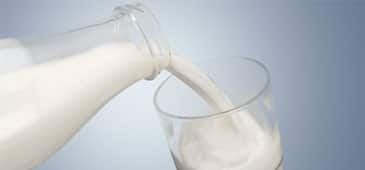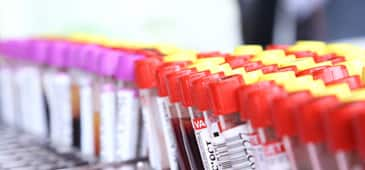
What's Hot
What's Hot
News flashes are posted here frequently to keep you up-to-date with the latest advances in health and longevity. We have an unparalleled track record of breaking stories about life extension advances.
Chemotherapy patients could benefit from lactoferrin
 September 28 2018. The September 2018 issue of Food & Function revealed a potential benefit for supplementing with lactoferrin (a protein that occurs in milk and saliva) during chemotherapy. A study conducted by Virginia Tech researchers revealed that lactoferrin could help improve chemotherapy-related loss of taste and smell that can reduce food intake.
September 28 2018. The September 2018 issue of Food & Function revealed a potential benefit for supplementing with lactoferrin (a protein that occurs in milk and saliva) during chemotherapy. A study conducted by Virginia Tech researchers revealed that lactoferrin could help improve chemotherapy-related loss of taste and smell that can reduce food intake.
"The underlying molecular mechanisms of taste and smell abnormalities are not well-understood," commented researcher Susan Duncan. "The prevailing symptom described by patients undergoing chemotherapy is a persistent metallic flavor or aftertaste, with or without food intake. This can last for hours, weeks, or even months after the completion of treatments."
In the current study, 12 healthy participants and 19 cancer patients with chemotherapy-related taste and smell abnormalities were given 250 milligrams lactoferrin three times daily for 30 days. Saliva samples were analyzed for proteins and minerals at the beginning of the treatment period, at 30 days, and 30 days after the end of treatment.
While experiencing a significant level of taste and smell abnormalities was associated with a loss of salivary immune proteins and high salivary iron, these changes were modified following supplementation with lactoferrin. "Our research shows that daily lactoferrin supplementation elicits changes in the salivary protein profiles in cancer patients - changes that may be influential in helping to protect taste buds and odor perception," Professor Duncan reported. "By suggesting lactoferrin as a dietary supplement, we can reduce taste and smell abnormalities for many patients, restoring their ability to enjoy foods during a time in which nutrition can play a key role in their recovery. This research could help us develop taste and smell abnormalities-targeted biomarkers and strategies for improving quality of life during chemotherapy. Cancer patients and their supporting family and friends may again find comfort in enjoying a meal together."
—D Dye
Molecule produced during calorie restriction delays vascular aging
 September 26 2018. The September 20, 2018 issue of Molecular Cell reported the discovery of researchers at Georgia State University of a protective effect on the vascular system for a molecule produced during fasting or calorie restriction
September 26 2018. The September 20, 2018 issue of Molecular Cell reported the discovery of researchers at Georgia State University of a protective effect on the vascular system for a molecule produced during fasting or calorie restriction
"The most important part of aging is vascular aging,” explained senior author Ming-Hui Zou. “When people become older, the vessels that supply different organs are the most sensitive and more subject to aging damage, so studying vascular aging is very important. This study is focused on vascular aging, and in old age, what kind of changes happen and how to prevent vascular aging."
During periods of calorie restriction, the ketone body known as beta-hydroxybutyrate is produced by the liver from fatty acids. Beta-hydroxybutyrate promotes cell division, which becomes impaired when senescent cells can no longer divide. "We found this compound, beta-hydroxybutyrate, can delay vascular aging," Dr Zhou reported. "That's actually providing a chemical link between calorie restriction and fasting and the antiaging effect. This compound can delay vascular aging through endothelial cells, which line the interior surface of blood vessels and lymphatic vessels. It can prevent one type of cell aging called senescence, or cellular aging."
Dr Zou’s team determined that the binding of beta-hydroxybutyrate to a specific protein increases the activity of a stem cell factor known as Oct4, which contributes to the prevention of senescence caused by DNA damage. "This stem cell factor (Oct4) could be a pharmaceutical or pharmacological target for slowing down or preventing aging,” Dr Zou suggested. “Then, if the vascular system becomes younger, it is less likely to have cardiovascular disease, Alzheimer's disease and cancer because all of these diseases are age-related."
"How to actually delay aging is a major pathway to reducing the incident and severity of human disease.”
—D Dye
Lower melatonin levels in men with ED
 September 24 2018. The July-August 2018 issue of the International Brazilian Journal of Urology reported the finding of Turkish researchers of significantly lower serum melatonin levels in men with erectile dysfunction (ED) in comparison with men who did not have the condition. Melatonin is a hormone released by the pineal gland in the brain that helps induce sleep and is associated with other positive health effects. The study is the first, to authors Aliseydi Bozkurt and colleagues’ knowledge, to evaluate the relationship between serum melatonin levels and ED.
September 24 2018. The July-August 2018 issue of the International Brazilian Journal of Urology reported the finding of Turkish researchers of significantly lower serum melatonin levels in men with erectile dysfunction (ED) in comparison with men who did not have the condition. Melatonin is a hormone released by the pineal gland in the brain that helps induce sleep and is associated with other positive health effects. The study is the first, to authors Aliseydi Bozkurt and colleagues’ knowledge, to evaluate the relationship between serum melatonin levels and ED.
The study included 62 men diagnosed with mild, moderate or severe ED and 22 healthy men. Blood samples were analyzed for serum melatonin levels, lipids, and other factors.
While the healthy men had melatonin levels that averaged 44.6 nanograms per deciliter (ng/dL), those with mild, moderate and severe ED had levels that averaged 34.2 ng/dL, 33.3 ng/dL and 34.8 ng/dL.
The authors noted that oxidative stress is an important factor in the development of ED and that melatonin has antioxidant as well as anti-inflammatory effects. These effects may play a role in helping to protect against atherosclerosis, which is the cause of most cases of ED. Decreased melatonin levels have also been observed in people with diabetes and hypertension.
“In the present study, we found a significant relationship between ED presence and low serum melatonin levels,” the authors conclude. “This relationship suggests that melatonin deficiency may be of importance in ED etiology. If larger clinical trials confirm our findings, measurement of serum melatonin level may have an additive future role in ED diagnosis and melatonin replacement would find an indication for ED treatment.”
—D Dye
Decreased pretreatment vitamin D levels found in women diagnosed with breast cancer
 September 21 2018. An article appearing online on September 17, 2018 in Menopause, the journal of The North American Menopause Society (NAMS) revealed the finding of Brazilian researchers of insufficient serum levels of vitamin D at the time of breast cancer diagnosis in postmenopausal women.
September 21 2018. An article appearing online on September 17, 2018 in Menopause, the journal of The North American Menopause Society (NAMS) revealed the finding of Brazilian researchers of insufficient serum levels of vitamin D at the time of breast cancer diagnosis in postmenopausal women.
The study included 209 postmenopausal women between the ages of 45 and 75 years whose serum 25-hydroxyvitamin D [25(OH)D] levels were measured 10 to 20 days following their breast cancer diagnosis. A group of 418 postmenopausal women of the same age group who did not have the disease served as control subjects.
Women with breast cancer had a higher body mass index and a greater percentage of obesity than subjects who did not have the disease. Insufficient vitamin D levels, defined as 20 to 29 nanograms per milliliter (ng/mL) were present among 55.6% of breast cancer patients and 49.3% of the control group and deficient 25(OH)D levels of less than 20 ng/mL were found in 26.2% of patients and 20.3% of the controls. Adjusted analysis revealed a 50% greater risk of having low vitamin D levels among subjects with breast cancer than women without the disease.
"Although published literature is inconsistent about the benefits of vitamin D levels and breast cancer, this study and others suggest that higher levels of vitamin D in the body are associated with lowered breast cancer risk," commented Dr JoAnn Pinkerton, who is the executive director of NAMS. "Vitamin D may play a role in controlling breast cancer cells or stopping them from growing. Vitamin D comes from direct sunlight exposure, vitamin D3 supplements, or foods rich in vitamin D."
—D Dye
Resveratrol boosts arthritis treatment
 September 19 2018. In an article that appeared on August 30, 2018 in the Journal of Medicinal Food, Iraqi researchers reported the findings of a pilot trial that revealed improvement in knee osteoarthritis pain and inflammation with the addition of resveratrol to drug therapy. “To our knowledge, this study is the first pilot clinical trial that focuses on the effects of resveratrol on pain severity and inflammatory biomarkers of patients with mild to moderate knee osteoarthritis,” Bushra Hassan Marouf and colleagues announce.
September 19 2018. In an article that appeared on August 30, 2018 in the Journal of Medicinal Food, Iraqi researchers reported the findings of a pilot trial that revealed improvement in knee osteoarthritis pain and inflammation with the addition of resveratrol to drug therapy. “To our knowledge, this study is the first pilot clinical trial that focuses on the effects of resveratrol on pain severity and inflammatory biomarkers of patients with mild to moderate knee osteoarthritis,” Bushra Hassan Marouf and colleagues announce.
The study included 110 women and men between the ages of 45 and 75 who had been diagnosed with mild to moderate knee osteoarthritis. All participants received 15 milligrams per day of the nonsteroidal anti-inflammatory drug meloxicam with the addition of resveratrol or a placebo for 90 days. Pain and blood markers of inflammation were analyzed at the beginning and end of the trial.
Participants who received resveratrol reported a decrease in pain severity at the end of the 90-day treatment period in comparison with pain reported at the beginning of the trial, as well as in comparison with pain reported by the placebo group at 90 days. Treatment with resveratrol was associated with a significant reduction in serum levels of the proinflammatory markers tumor necrosis factor-alpha (TNF-a), interleukin-1 beta (IL-1b), interleukin-6 (IL-6) and high-sensitivity C-reactive protein (hs-CRP) compared with levels measured at the beginning of the study and levels among the placebo group after 90 days.
“The presented data support the suggested role of many natural polyphenols, such as resveratrol, as a complementary treatment option in the management of pain and inflammation, the markers of disease progression in knee osteoarthritis,” the authors write. “These findings suggest that resveratrol may be an effective ‘add-on’ option with meloxicam in the treatment of patients with mild to moderate knee osteoarthritis.”
—D Dye
Antioxidants protect against cartilage damage
 September 12 2018. An article appearing September 12, 2018 in Science Translational Medicine adds evidence to the role of antioxidants in protecting the body’s cartilage from the damage that contributes to osteoarthritis.
September 12 2018. An article appearing September 12, 2018 in Science Translational Medicine adds evidence to the role of antioxidants in protecting the body’s cartilage from the damage that contributes to osteoarthritis.
Acting on the finding that the protein ANP32A, which is involved in a number of processes in the body, was downregulated in osteoarthritic cartilage in mice and humans, Frederique Cornelis of the Skeletal Biology and Engineering Research Center in Belgium and colleagues discovered that ANP32A protects against oxidative damage in the joints, thereby helping to prevent the development of osteoarthritis and its progression. It was determined that ANP32A increases levels of the enzyme ATM, a regulator of the cellular oxidative defense, in response to oxidative stress in joint cartilage.
The discovery suggests that antioxidant therapies could help protect against further damage in patients with osteoarthritis, as well as providing a benefit in other disorders. Administration of the antioxidant N-acetylcysteine (NAC) to the drinking water of mice that were deficient in ANP32A was shown to decrease cartilage damage and arthritis symptoms. It was additionally revealed that ANP32A deficiency was associated with osteopenia and a neurologic disease known as cerebellar ataxia in mice and that NAC helped with these conditions.
“Aging, a key risk factor for the development of osteoarthritis, is associated with elevated oxidative damage of DNA, proteins, and lipids, and accumulating evidence indicates that oxidative stress is a major physiological inducer of aging,” the authors write. “We observed reduced expression of ANP32A in aged mouse cartilage and in human cartilage from patients with osteoarthritis, and we showed that Anp32a-deficient mice develop spontaneous osteoarthritis upon aging. Thus, ANP32A can be considered as a key coordinator of oxidative stress and aging in joints.”
“Our findings indicate that modulating ANP32A signaling could help manage oxidative stress in cartilage, brain, and bone with therapeutic implications for osteoarthritis, neurological disease, and osteoporosis,” they conclude.
—D Dye
Discovery adds evidence to benefit of unsaturated fat in heart attack prevention
 September 10 2018. Research reported on September 6, 2018 in Nature Communications helps explain why greater consumption of unsaturated fat such as olive oil is associated with a lower risk of heart attack or stroke.
September 10 2018. Research reported on September 6, 2018 in Nature Communications helps explain why greater consumption of unsaturated fat such as olive oil is associated with a lower risk of heart attack or stroke.
Heyu Ni and colleagues determined that apolipoprotein A-IV, which increases in the blood following the digestion of food (especially unsaturated fat) blocks platelet surface glycoproteins known as integrin αIIβ3 that are necessary for platelets to clump together. By linking to integrin αIIβ3, apolipoprotein A-IV blocks fibrinogen binding, which reduces platelet aggregation. The increase of apolipoprotein A-IV in response to the presence of unsaturated fat helps prevent the stimulation of platelet activity that normally follows a meal, thereby lowering the risk of a cardiovascular event.
"Platelet aggregation can save lives, because it can stop bleeding in damaged vessels," explained principal investigator Dr Heyu Ni, who is the Platform Director for Hematology, Cancer and Immunological Diseases at the Keenan Research Center. "But we usually don't want platelets to block blood flow in the vessels. This is thrombosis, and if vessel occlusion occurs in the heart or brain, it can cause heart attack, stroke or death."
Of interest, humans exhibit the greatest amount platelet aggregation at around 6:00 a.m., when apolipoprotein levels are at their lowest. "Mother Nature wants us to sleep well," Dr Ni remarked. "So we are protected by this protein while we sleep, and most likely to experience a cardiovascular event after waking up in the morning."
“Control of food consumption (e.g., increase of unsaturated fat), which raises apolipoprotein A-IV synthesis and secretion, may have a significant impact on the prevention of the early developmental stages of atherosclerosis,” the authors conclude. “Infusion of recombinant apolipoprotein A-IV may be able to directly intervene in thrombosis and control cardiovascular diseases and stroke.”
—D Dye
Eating just once a day associated with longer life in mice
 September 7 2018. An article published on September 6, 2018 in Cell Metabolism reported the finding of researchers from the National Institute on Aging (NIA), the University of Wisconsin-Madison, and the Pennington Biomedical Research Center in New Orleans of a longevity benefit for once-per-day feeding in male mice.
September 7 2018. An article published on September 6, 2018 in Cell Metabolism reported the finding of researchers from the National Institute on Aging (NIA), the University of Wisconsin-Madison, and the Pennington Biomedical Research Center in New Orleans of a longevity benefit for once-per-day feeding in male mice.
Two hundred ninety-two mice were divided to receive one of two diets. One diet was naturally-sourced and was lower in fat and added sugar and higher in protein and fiber than the other diet. Each group was divided into subgroups that received one of the following three regimens: unrestricted access to food, food that provided 30% fewer daily calories than the amount consumed by unrestricted group, or one meal per day that contained the same number of calories consumed by the unrestricted group.
Calorie-restricted mice and mice fed once daily survived longer than the animals who ate as much as they liked and experienced delays in the development of age-related damage to the liver and other organs. Diet composition was not found to affect the lifespan of these groups.
"This study showed that mice who ate one meal per day, and thus had the longest fasting period, seemed to have a longer lifespan and better outcomes for common age-related liver disease and metabolic disorders," reported NIA Director Richard J. Hodes, MD. "These intriguing results in an animal model show that the interplay of total caloric intake and the length of feeding and fasting periods deserves a closer look."
"Increasing daily fasting times, without a reduction of calories and regardless of the type of diet consumed, resulted in overall improvements in health and survival in male mice," concluded lead researcher Rafael de Cabo, PhD. "Perhaps this extended daily fasting period enables repair and maintenance mechanisms that would be absent in a continuous exposure to food."
—D Dye
Natural antioxidant could help protect against second cardiovascular event
 September 5 2018. The August 28, 2018 issue of the Journal of the American College of Cardiology reported the finding of researchers at Oregon Health & Science University of a protective effect for apocynin against the risk of a second heart attack or stroke. Apocynin is a compound that occurs in Picrorhiza kurroa and other plants that, in addition to its antioxidant effects, has anti-inflammatory and other benefits. It is structurally related to vanillin, the primary component of vanilla bean extract. Apocynin has the ability to inhibit NADPH oxidase (Nox), an enzyme that produces reactive oxygen species (a type of free radical), which can damage the body’s proteins and increase disease susceptibility.
September 5 2018. The August 28, 2018 issue of the Journal of the American College of Cardiology reported the finding of researchers at Oregon Health & Science University of a protective effect for apocynin against the risk of a second heart attack or stroke. Apocynin is a compound that occurs in Picrorhiza kurroa and other plants that, in addition to its antioxidant effects, has anti-inflammatory and other benefits. It is structurally related to vanillin, the primary component of vanilla bean extract. Apocynin has the ability to inhibit NADPH oxidase (Nox), an enzyme that produces reactive oxygen species (a type of free radical), which can damage the body’s proteins and increase disease susceptibility.
“In the months after acute myocardial infarction (MI), risk for acute atherothrombotic events in nonculprit arteries increases several fold,” note authors Federico Moccetti, MD, and colleagues. “This study investigated whether sustained proinflammatory and prothrombotic endothelial alterations occur in remote vessels after MI.”
For their research, the team used normal mice and mice that were genetically modified to develop atherosclerosis. Some of the mice with atherosclerosis were treated with apocynin.
Three days after the animals underwent heart attacks, the researchers observed increased adhesion of inflammatory cells and platelets to the lining of the arteries (particularly in areas where there was pre-existing plaque), which causes unstable plaque and elevates the risk of another event. The changes resolved in the normal mice after 21 days but persisted in those with atherosclerosis; however, animals treated with apocynin had reduced plaque growth and less inflammation.
"Knowing that newer forms of antioxidants such as apocynin can lower the risk of a second heart attack or stroke gives us a new treatment to explore and could one day help reduce heart attacks and strokes," corresponding author Jonathan R. Lindner, MD, predicted.
—D Dye

